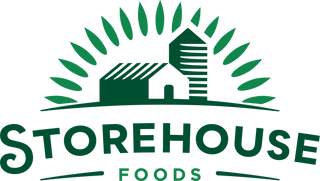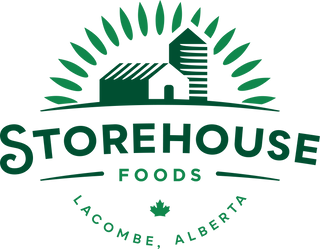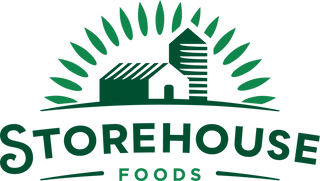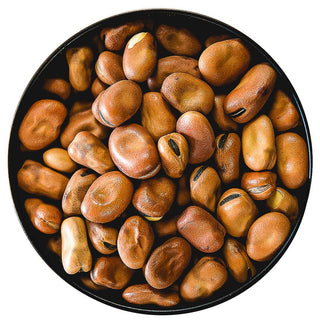Faba Beans
Non-GMO, Raw Faba Beans, Product of Canada
Origin
Grown in the Canadian Prairies
Why Faba Beans:
Faba beans — or broad beans, also known as fava beans — are green legumes that come in pods. They have a slightly sweet, earthy flavor and are eaten by people all over the world. Faba beans are loaded with vitamins, minerals, fiber and protein. They’re thought to offer impressive health effects, such as improved motor function and immunity.
One cup of cooked faba beans contains almost a third of your daily protein needs. Vegetarians, vegans, and people with lactose intolerance can’t eat high-protein foods from animals like meat, cheese, or eggs. Adding faba beans and other plant sources in your diet can help make sure you're getting enough protein.
Fava or Faba? Which one is correct?
The debate over the spelling of "fava" versus "faba" beans has roots that delve deep into historical, linguistic, and botanical discussions. Fava beans, also known as broad beans, are a type of flowering plant in the pea and bean family Fabaceae. They are among the most ancient plants in cultivation and also one of the easiest to grow. The controversy over their naming convention, however, is a fascinating blend of tradition, language evolution, and scientific classification.
Historically, the term "fava" comes from the Italian word for the bean, "fava," which has been used for centuries in Mediterranean cuisines. The word "faba," on the other hand, finds its origins in Latin, where "faba" literally means "bean." This Latin root is the base from which the scientific name for the family, Fabaceae, is derived. The distinction between "fava" and "faba" often hinges on regional language preferences and historical usage, with "fava" being more commonly used in English-speaking countries, particularly in culinary contexts, while "faba" is often found in scientific and academic writing.
The debate is not merely academic or linguistic; it reflects broader discussions about the standardization of plant names and the importance of honoring traditional and regional naming conventions. Proponents of the "fava" spelling argue that it respects the culinary and cultural heritage associated with the bean, particularly in Italian and Mediterranean cuisines. Advocates for "faba," meanwhile, emphasize the value of consistency in botanical nomenclature and the benefits of a universal naming system that ties back to the plant's Latin roots. Ultimately, the choice between "fava" and "faba" may come down to the context in which the term is used—whether one is emphasizing culinary tradition or scientific classification. Regardless of the spelling, these beans remain a versatile and nutritious staple in diets around the world.
Storage
Store dry and raw beans in a sealed container in a cool dry place. Use within one year for best quality. Cooked beans can be stored in a sealed container in the fridge for 3 to 4 days. You may also store cooked beans in the freezer for up to one year in a sealed container or freezer bag.
Disclaimer: This information is for educational purposes only. It is not intended to diagnose, treat, cure, or prevent any disease. The information provided is for educational purposes only and not intended as medical advice. Consult your professional health expert for medical advice. This product has been packaged in the same facility as wheat, tree nuts, barley, and other potential allergens.
Faba Beans
Non-GMO, Raw Faba Beans, Product of Canada
Origin
Grown in the Canadian Prairies
Why Faba Beans:
Faba beans — or broad beans, also known as fava beans — are green legumes that come in pods. They have a slightly sweet, earthy flavor and are eaten by people all over the world. Faba beans are loaded with vitamins, minerals, fiber and protein. They’re thought to offer impressive health effects, such as improved motor function and immunity.
One cup of cooked faba beans contains almost a third of your daily protein needs. Vegetarians, vegans, and people with lactose intolerance can’t eat high-protein foods from animals like meat, cheese, or eggs. Adding faba beans and other plant sources in your diet can help make sure you're getting enough protein.
Fava or Faba? Which one is correct?
The debate over the spelling of "fava" versus "faba" beans has roots that delve deep into historical, linguistic, and botanical discussions. Fava beans, also known as broad beans, are a type of flowering plant in the pea and bean family Fabaceae. They are among the most ancient plants in cultivation and also one of the easiest to grow. The controversy over their naming convention, however, is a fascinating blend of tradition, language evolution, and scientific classification.
Historically, the term "fava" comes from the Italian word for the bean, "fava," which has been used for centuries in Mediterranean cuisines. The word "faba," on the other hand, finds its origins in Latin, where "faba" literally means "bean." This Latin root is the base from which the scientific name for the family, Fabaceae, is derived. The distinction between "fava" and "faba" often hinges on regional language preferences and historical usage, with "fava" being more commonly used in English-speaking countries, particularly in culinary contexts, while "faba" is often found in scientific and academic writing.
The debate is not merely academic or linguistic; it reflects broader discussions about the standardization of plant names and the importance of honoring traditional and regional naming conventions. Proponents of the "fava" spelling argue that it respects the culinary and cultural heritage associated with the bean, particularly in Italian and Mediterranean cuisines. Advocates for "faba," meanwhile, emphasize the value of consistency in botanical nomenclature and the benefits of a universal naming system that ties back to the plant's Latin roots. Ultimately, the choice between "fava" and "faba" may come down to the context in which the term is used—whether one is emphasizing culinary tradition or scientific classification. Regardless of the spelling, these beans remain a versatile and nutritious staple in diets around the world.
Storage
Store dry and raw beans in a sealed container in a cool dry place. Use within one year for best quality. Cooked beans can be stored in a sealed container in the fridge for 3 to 4 days. You may also store cooked beans in the freezer for up to one year in a sealed container or freezer bag.
Disclaimer: This information is for educational purposes only. It is not intended to diagnose, treat, cure, or prevent any disease. The information provided is for educational purposes only and not intended as medical advice. Consult your professional health expert for medical advice. This product has been packaged in the same facility as wheat, tree nuts, barley, and other potential allergens.
You may also like
You may also like
Reviews
I ordered a bag of fava beans from Storehouse Foods and within a week they arrived. I'm very pleased with how clean and unbroken they are. After soeaking them for a couple of days I made a big batch batch of falafels. The taste is excellent! Though I won't need fava beans for a while, I would like to order some of the their other interesting products. Highly recommended.










